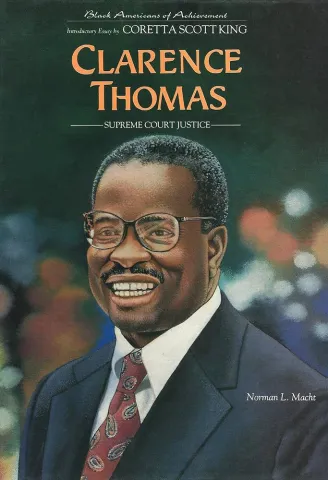
Clarence Thomas
Supreme Court Justice
As a child Clarence Thomas said, “I could not dare dream that I would ever see the Supreme Court, not to mention be nominated to it.”
Born in the small town of Pin Point, Georgia, in 1948, Thomas grew up in the home of his grandfather, Myers Anderson, in nearby Savannah. A proud, enterprising man, Anderson taught his grandson to work hard and make something of himself. These lessons were reinforced by the nuns in Savannah’s Catholic schools, where Thomas became an excellent student and a fine athlete.
After graduating from the College of the Holy Cross in 1971 and the Yale Law School in 1974, Thomas began a highly successful career in public service. He went on to serve as chairman of the Equal Employment Opportunity Commission (EEOC) from 1982 to 1989, and achieved some notable successes. Nevertheless, his conservative views and his opposition to affirmative action programs enraged a number of civil rights advocates.
Nominated by President George Bush to serve on the Supreme Court in 1991, Thomas confronted a bitter and bruising round of Senate hearings that engrossed the American public, but he finally wound confirmation. Today, as only the second black justice in the history of the Supreme Court, he continues to champion the ideals of hard work and self-discipline that have shaped his life.
-- Critically acclaimed biographies of history's most notable African-Americans
-- Straightforward and objective writing
-- Lavishly illustrated with photographs and memorabilia
-- Essential for multicultural studies
This book follows Thomas's life from his childhood in Georgia to his appointment as Supreme Court Justice. Most of the text deals with experiences that influenced him; this focus on his early life results in a simple and incomplete picture of the man. Macht certainly presents the subject's admirable qualities, but leaves unexplored important facets of his personality. The basis and extent of his work in the legal arena is largely ignored. However, the investigation of his views is especially timely, echoed in the recent Supreme Court decision on affirmative action. The controversy with Anita Hill is addressed, but the emphasis is on the confirmation process and its effect on Thomas and his family. The writing style is inviting and easy to read. Occasionally, however, odd, seemingly unrelated facts are interjected and minor stories sometimes ramble. Black-and-white photos are informative and well placed. Jane Mayer and Jill Abramson's Strange Justice (Houghton, 1994) investigates Thomas's road to the Supreme Court in a more critical fashion, and serves as a mirror opposite in developing a picture of the man's success.
—Carrol McCarthy, Tower Hill School, Wilmington, DE
Copyright 1995 Reed Business Information, Inc.
